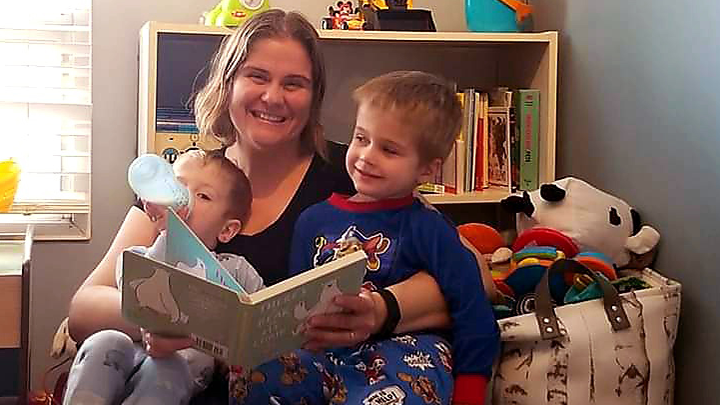
May 14, 2020

Right from birth, parents can read to their children to build literacy.
Teaching children to read is an investment in their future and improves their lives in many ways. Here’s why reading matters:

The Abbenhuis family crowns each evening by reading with their children. Shown, from left to right, Renly, mom Avalon and Ryker. Photo Credit: Abbenhuis Family

Reading for as little as 15 minutes a few nights a week helps a child with their reading skills.

Experts say it’s never too early to start reading to your infant. And it helps prepare your child for school.

As a parent, you are your child’s first and most important teacher. You have the power to shape a love for learning by reading to them.
Children are born with a love of language. They learn words by listening to you and mimicking what you say, right from their earliest days.
Talking, singing and reading to your child builds their vocabulary and talking and listening skills. Reading every day with your child helps their brains develop and strengthens family bonds.
During these times of self-isolation and physical distancing, reading is a reassuring daily ritual for children. And it can be a calming stress-reducer for moms, dads and caregivers as well.
“Research indicates that reading aloud is one of the most important things you can do to help a child prepare for reading and learning,” says Farah Bandali, a director with Alberta Health Services’ Healthy Living team.
“Learning to read is the key to learning in general. The benefits include brain development, better concentration and cognitive skills and more self-confidence for your child. It truly sets them up to succeed.”
As a parent, you are your child’s first (and most important) teacher. You have the power to shape a love for learning that fuels their later success in school and life.
“Reading aloud to your child has proven cognitive benefits for comprehending stories, understanding words, and developing visual imagery,” says Krista Dumba of Alberta Health Services. She's a health promotion facilitator with the Provincial Addiction and Mental Health team in Calgary.
“Reading also helps their social and emotional growth,” adds Dumba. “Early on, the pictures and stories you share together will help your child learn words to describe their experiences and feelings. This helps them say what they feel rather than act out how they feel.”
Want your child to read more? Lead by example. To raise a reader you have to be a reader.
Reading offers many others benefits. It opens doors to new worlds, new ideas and new opportunities to grow.
For school-age kids, continuing reading during COVID-19 ensures they improve or maintain the skill. For example, children who do not read over summer holidays can lose some of their reading and literacy skills.
"You don’t want kids to lose their momentum,” says Rebecca Ibbotson. The Grade 1 and 2 teacher at Silver Springs School in Calgary was speaking in an Apple magazine article. "While they’re in school, there’s a lot of self-esteem and confidence tied into whether you can read or not. Many students are reluctant to get back into reading after falling behind."
She says reading for as little as 15 minutes a few nights a week helps a child keep their reading skills. And it can be fun and easy. Play games such as I Spy. Listening to audiobooks during a long drive. Have children make up and tell stories anytime. Hold a simple spelling bee. These are just a few activities children can do to build reading skills.
Older children may like to read and talk about a novel with a parent. Reading and screen time need to be balanced because they are two different activities.
You can also find many online resources that promote and build reading skills. We recommend:
The roots of literacy — begin early, virtually from birth. And they start with your child listening to the sound of your voice.
“Reading, talking, chanting, singing and cooing. They’re all how kids begin to develop the notion of sound, and the sounds means something,” says Steacy Pinney. She’s the founder and CEO of Calgary Reads, which helps people of all ages improve their reading.
You can read almost anything to a child in the first months of their lives. A newspaper, a magazine or a story book. Around six to nine months, you can introduce baby books and settle in, snuggle up and spend time reading to your child.
Let them repeat words or ask them questions. Reading at this age is about interaction.
It also builds early awareness of shapes and symbols — such as squares, circles and triangles. Learning shapes and sounds prepare children to learn letters and words.
When families sit, spend time and eat meals together, their children learn sooner to put sounds together to make words, and to put words into sentences.
The books you enjoy together don’t always have to be on paper.
While we often don’t think of our screens as reading, we really do “read” them all the time.
One resource worth checking out is the Read Aloud series and free downloads offered by Calgary Reads.
It features wonderful stories read aloud by enthusiastic and animated readers. They even flip the pages—and share tips for reading to your child.
“Not all books on screen do this,” Pinney advises. “You want to read online books with the back and forth of talking with and responding to your child. It’s about being present and in the moment. You want to truly engage with your child and build their enjoyment of reading and learning.”
For more about using screens in your family’s life, see I’m Ready for Screens! from Calgary Reads. Also see Screen Time from Health Parents Healthy Children.
Pre-literacy is crucial for success in school.
“When kids don’t have a foundation for literacy, they’re behind when they start to formally read,” Pinney says. Literacy, she emphasizes, needs to start long before schools.
Reading to your children from infancy makes them feel comfortable with words and symbols. It helps them understand they have meaning. It will also help develop the emotional and cognitive skills children need to focus and concentrate in class.
Kids don’t have to be reading on the first day of school. But if they’re versed in pre-literacy, they’ll likely know their letters and may even be able to write their name. These skills will help put them on a path to success.
Read anytime. Start early. Help your baby build their brain architecture. They’ll like it!
Take your time. There’s no rush. Let your child look at the whole page, words and pictures alike. Watch as they ponder. Let them touch and turn the pages.
Ask questions. Who’s this? What’s she thinking? What’s going on? What will happen next? Help your child analyze and imagine.
Pick books you enjoy. If you like the tale, odds are your child will, too.
We get it. Some days you’ll feel like — “I can’t read Dr. Seuss’ Hop on Pop or Pat the Bunny one more time.” But kids love and learn from repetition. Think of it as the sound of neural pathways being built.
Keep in mind that kids just can’t say “mama” — they have to hear it hundreds and hundreds of times to get the hang of it.
“Children like to hear the same books over and over because they are familiar with the story,” says Beverly Collisson. She’s a research assistant professor in the Department of Pediatrics in the University of Calgary’s Faculty of Medicine.
“It gives them an opportunity to interact with the story, and it provides a basis from which to create their own story.”
Children’s books are important because the language is predictable.
“It can be repeated over and over many times, so a child can learn the language and start to understand the concepts,” Collisson adds.
Avalon and Justin Abbenhuis crown each day by cuddling and reading to their sons Ryker, 4, and Renly, 22 months.
“We pull out two to three books at bedtime and sit on the couch,” says the Edmonton mom. “We read them stories and ask questions like, ‘Can you point out the mouse?’ or ‘Where’s the polar bear?’ ”
The boys love books about colours, especially the family’s book about numbers. They can’t wait to get to number 8 — because it’s a picture of a doughnut bear.
Dad Justin adds: “Often, Ryker will stop to tell us all about his favourite doughnuts — chocolate, banana and strawberry. He knows some books really well, just loves them, and actually finishes the sentences for me.”
Both parents say daily reading has boosted life skills for both boys, and kept the family as close and snug throughout their self-isolation at home.
Playing with language is fun!
Rhyming and word play help children hear differences in sounds, and understand words are made of sounds.
“Even if it becomes nonsense, playing with language will help your child learn to read and write,” says Liz Duncan of Edmonton’s Centre for Family Literacy.
The centre offers more than 120 fun activities you can do with your children to boost and build key literacy skills from birth to age five. Its free Families Learning and Interacting Together (FLIT) app is available to download for Apple and Android devices.
Building vocabulary is a big plus. Research shows one in four Canadian children are behind their peers in literacy and language skills when they start school.
Many will continue to fall behind with each passing year as the gap with their peers widens.
By the time they get to Grade 6 or 9, they can have a considerable difference in their ability to read, talk, and communicate— and to get the good marks.
As your child progresses, always remember — the more words the merrier.
Literacy weaves through all aspects of our lives—health, employment, education, social welfare and justice—and is the foundation for all learning.
“Family literacy is not just about reading and writing,” says the Centre for Family Literacy in Edmonton. “It's about developing stronger relationships between parents and their children and getting parents involved in their children's education.
“It’s about building stronger families and healthy communities.”